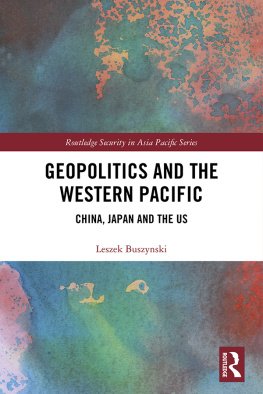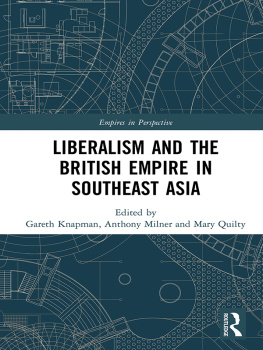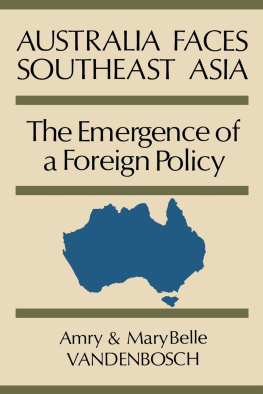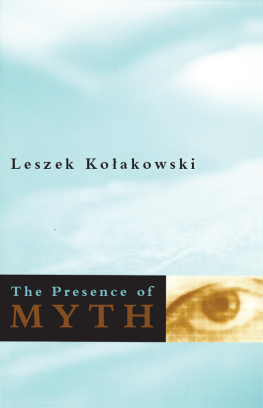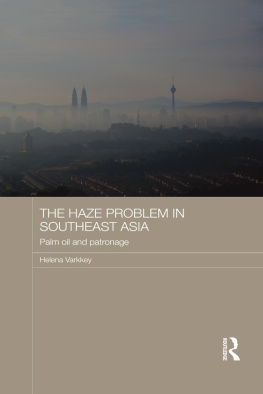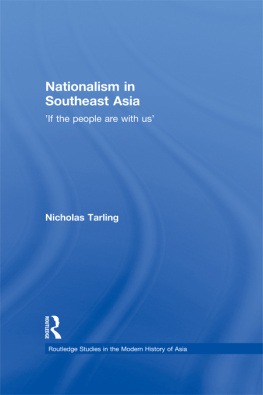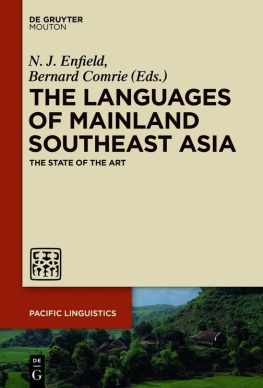Routledge Revivals
Gorbachev and Southeast Asia
First published in 1992, this book examines Soviet foreign policy towards Southeast Asia in the context of the transformation of the perestroika era in the Soviet Union. The discussion begins in 1985 and ends in 1989 with the Soviet partial withdrawal from Cam Ranh Bay. Buszynski considers Gorbachevs effort to disengage from the Cambodian problem, the weakening of the Soviet alliance with Vietnam and the real effort to overcome old hostilities with growth areas in ASEAN such as Thailand and Singapore. This is a fascinating and relevant title, of particular value to students with an interest in Russia and the history of international relations in Southeast Asia.
Gorbachev and Southeast Asia
Leszek Buszynski
First published in 1992
by Routledge
This edition first published in 2013 by Routledge
2 Park Square, Milton Park, Abingdon, Oxon, OX14 4RN
Simultaneously published in the USA and Canada
by Routledge
711 Third Avenue, New York, NY 10017
Routledge is an imprint of the Taylor & Francis Group, an informa business
1992 Leszek Buszynski
All rights reserved. No part of this book may be reprinted or reproduced or utilised in any form or by any electronic, mechanical, or other means, now known or hereafter invented, including photocopying and recording, or in any information storage or retrieval system, without permission in writing from the publishers.
Publishers Note
The publisher has gone to great lengths to ensure the quality of this reprint but points out that some imperfections in the original copies may be apparent.
Disclaimer
The publisher has made every effort to trace copyright holders and welcomes correspondence from those they have been unable to contact.
A Library of Congress record exists under LC control number: 91044799
ISBN 13: 978-0-415-83119-2 (hbk)
ISBN 13: 978-0-203-76270-7 (ebk)
ISBN 13: 978-0-415-70350-5 (pbk)
Gorbachev and Southeast Asia
Leszek Buszynski
First published 1992
by Routledge
11 New Fetter Lane, London EC4P 4EE
Simultaneously published in the USA and Canada
by Routledge
a division of Routledge, Chapman and Hall, Inc.
29 West 35th Street, New York, NY 10001
1992 Leszek Buszynski
Printed and bound in Great Britain by Biddles Ltd,
Guildford and Kings Lynn.
All rights reserved. No part of this book may be reprinted or reproduced or utilized in any form or by any electronic, mechanical, or other means, now known or hereafter invented, including photocopying and recording, or in any information storage or retrieval system, without permission in writing from the publishers.
British Library Cataloguing in Publication Data
A catalogue record for this title is available from the British Library.
Library of Congress Cataloging in Publication Data
Buszynski, Leszek,
Gorbachev and Southeast Asia/Leszek Buszynski.
p. cm. (Politics in Asia series)
Includes index
ISBN 0-415-06342-6
1. Asia. SoutheasternForeign relationsSoviet Union. 2. Soviet UnionForeign relationsAsia. Southeastern. 3. Soviet UnionForeign relations1985- 4. Gorbachev, Mikhail Sergeevich, 1931-. I. Title. II. Series: International politics in Asia series.
DS525.9.S65B86 1992
327.47059dc20
9144799
CIP
Contents
Soviet military assistance to Indochina
Vietnamese exports to the Soviet Union (selected products)
Comparison of 1983 and 1988 base amendment agreements
Soviet-Vietnamese trade
Soviet commodity exports to Vietnam
Major Soviet imports from Vietnam
Soviet-ASEAN trade, 1984-9
Soviet exports of machinery and transport equipment to ASEAN, 1984-9
Major Soviet imports from ASEAN by country and commodity, 1984-9
Soviet rubber, palm oil and coconut oil imports from ASEAN, 1984-9
Foreword
Mikhal Gorbachev has ceased to be the President of the Soviet Union with its disintegration and succession by a Commonwealth of Independent States. Despite his loss of high office and power, it can not be forgotten that soon after becoming General Secretary of the now defunct Communist Party of the Soviet Union in March 1985, Mr Gorbachev took radical initiatives in foreign policy which set in train unanticipated and remarkable global change. He may have been motivated by a misguided reformism but he was the undoubted pioneer of the end of the Cold War. Driven by economic imperative, Mr Gorbachev took steps early on in his tenure to detach the Soviet Union from close involvement in regional conflicts with the object of improving relations with the major powers. Leszek Buszynski addresses the formulation and application of this innovative policy with special reference to Southeast Asia and within it the Cambodian conflict.
Dr Buszynski established his reputation as a discerning student of the external conduct of the Soviet Union with his book Soviet Foreign Policy and Southeast Asia published in 1986. The study which follows, which will enhance that reputation, is a completely new undertaking; not a revised edition. This book is distinguished by a meticulous use of Russian source material including interviews conducted in Moscow and also by a close attention paid to the important domestic context of policy making. The outcome is a scholarly analysis of the complexities of Soviet disengagement from a regional dimension of the Cold War and of the repositioning of Southeast Asia in its priorities. Dramatic changes in political fortunes have beset both Mikhal Gorbachev and the Soviet Union since that disengagement was effected. This study possesses intrinsic merits as an account of an erstwhile superpower coming to terms with its over-stretched resources in a particular regional context. It also provides an important link between past and present through identifying and illuminating Gorbachevs diplomatic legacy with which the successor republics of the Soviet Union will have to live in coping with their external environment.
Michael Leifer
December 1991
Preface
Gone are the days when dispassionate and studiously detached scholars could write meticulously documented works on what was known as Soviet foreign policy without reference to domestic politics. No longer can popular commentators, publicists and journalists get away with rapidly conceived summaries of so-called Soviet foreign policy moves without some insight into political bargaining between institutions and republics. The era of Soviet totalitarianism or party authoritarianism in one sense simplified matters for writers on Soviet foreign policy by removing the dimension of domestic politics as an area of research. Observers of Soviet foreign policy were, for many years, free of the hazards and dangers of venturing into domestic politics, while the party and the rigidly compartmentalized decisionmaking structure survived in the Soviet Union. The consequence was that works on Soviet foreign policy for the most part focused upon the external interaction of the Soviet Union with other states. Attention was shifted from aims and values towards means and tactics in the belief, as some put it, that those aims and values were axiomatic.





